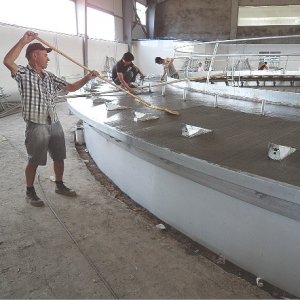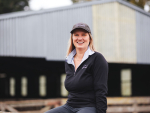In partnership with Afimilk, an Israeli dairy management systems company, Waikato Milking Systems was competing against big names such as De Laval, GEA/Westfalia and BouMatic.
The purchase is said to be one of the largest in China’s agricultural history and Mengnui is the one of the largest dairy companies in that country.
Waikato Milking Systems will supply the rotary platforms and a key part of the milking structure, with Afimilk supplying the computerised dairy management systems.
“It is a real feather in our cap,” Bell says of the tender worth $4.5m to $5m to Waikato Milking Systems. “Because it has been fought so aggressively by the major players, it gets recognised that New Zealand companies are at the forefront and it will be a significant boost for us.
“As New Zealand gains more and more recognition for being able to milk large numbers of cows and do that profitably, there’s been some good spin-offs for New Zealand companies abroad.”
Bell believes it will boost sales around the world. “I think the partnership between ourselves and Afimilk will be a key building block into a much more significant and faster growing international presence.”
Bell says the contracts will be rolled out farm-by-farm so, collectively, by the time all 13 are finished, it will be the biggest single project by the company.
The partnership of Afimilk’s specialisation in dairy herd management systems and Waikato offering the key part of the infrastructure provided the solution Mengniu wanted and was what the competitors couldn’t offer, Bell says.
Waikato Milking Systems hosted an 18-strong Chinese delegation, including Mengnui representatives and others at the end of March.
“They toured our facilities and some of our big rotary installations throughout New Zealand and I think that was instrumental in giving them the confidence our company here in New Zealand could provide the optimal solution that they were after.
“So that visit really cemented things in their minds. I think they were already comfortable that Afimilk had the right sort of herd management system. But they needed to be confident we could deliver rotary platforms in the robust format that could stand up in the China conditions.”
The purchase is part of Mengnui’s decision to gain greater control of milk quality by operating its own farms rather than buying milk from other dairies. Their farms will be intensive operations such as are commonly seen in the US and Europe, milking large numbers of cows 24/7.
“They will only shut the machine down for about an hour three times a day to clean…. The specification of the equipment needs to be able to handle that sort of use.”
Bell says winning the tender is big recognition for New Zealand agricultural technology. “One of the things we are good at is providing a good solution that is robust. Some of our systems are at the absolute pinnacle of what’s available around the world.”
Bell says Mengnui did not have to pay for technology it did not need. “Our New Zealand methods are very focused on performance and value and they saw they weren’t going to get that combination anywhere else.”
Waikato will supply Mengnui with two sizes of rotary – 40 and 80 bails – depending on which farm they go to. The most common will be 80 bails, among the biggest Waikato Milking manufactures.
Ease of maintenance was pivotal in winning the tender, Bell says. “I think the design of our rotary does not have unnecessary complexity or unnecessary weight. Physical weight of the platform is important when they are rotating 24 hours a day.”
Bell will himself head to China in October.
He expects the first two platforms to be supplied by the end of the year.
















